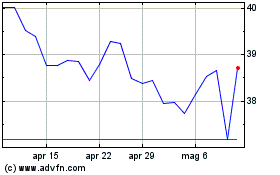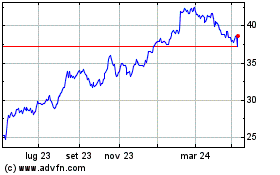By Joe Flint and Suzanne Vranica
For 21st Century Fox, this year's World Cup was essentially
decided when the U.S. men's team lost to Trinidad and Tobago last
October, and so failed to qualify for the tournament for the first
time since 1986.
Without a U.S. team, early World Cup rounds on Fox's networks
drew nearly a third fewer viewers than in 2014, and the company is
now expected to lose money on the 2018 tournament, according to
people familiar with the situation.
The ratings suggest that the growth in soccer's popularity in
the U.S. in recent years doesn't translate to TV viewing unless the
national team is involved. They also are a reminder that big-ticket
sports media deals, seen as among the safer bets in a pay-TV
industry buffeted by viewership fragmentation and cord-cutting, can
carry risks. Ratings for this year's Winter Olympics were down, and
the Super Bowl had its smallest audience in nearly a decade.
Fox will spend some $900 million on soccer rights through the
2026 World Cup, and plans to focus even more on sports if it
follows through on a sale of entertainment assets to either Walt
Disney Co. or Comcast Corp.
A Fox spokesman said ad revenue for this World Cup is on pace to
beat the 2014 figure, and the company is doing better than it
initially projected when the U.S. failed to qualify. Still,
viewership of the 2018 tournament on Fox's broadcast network and
its cable channel Fox Sports 1 averaged 2.6 million through the
quarterfinals, down about 32% from the 2014 tournament, which aired
on Disney's ESPN and ABC.
"The fact that the U.S. team didn't make it was a real setback
for Fox," said sports and media industry consultant Marc Ganis.
When the U.S. team failed to qualify, Fox cut its production
budget significantly and adjusted its ratings estimates for
advertisers, people familiar with the matter said. But it hasn't
been able to deliver the audiences it guaranteed in ad deals,
forcing it to provide additional ad time -- "make goods" -- as
compensation to some advertisers, ad executives said.
The ratings are also being hurt by the early start times for
games. The 2014 tournament was in Brazil, a much more convenient
time zone for U.S. viewers than this year's venue, Russia.
Even factoring out the U.S. team's absence, the audience for
much of the 2018 tournament has been smaller than in 2014. Ratings
have ticked up recently, and last Saturday's quarterfinal matches
on Fox scored higher ratings than the corresponding games in the
2014 tournament.
Fox and News Corp, parent of The Wall Street Journal, share
common ownership.
World Cup telecasts on Comcast Corp.'s Telemundo, which has the
Spanish-language rights -- and paid even more than Fox -- have
similarly drawn smaller audiences than the 2014 games on
Univision.
Like Fox, Telemundo won't show a profit for the World Cup,
people familiar with the matter said. A Telemundo spokesman
declined to comment on the profitability of telecasts.
But Telemundo executives said its ratings are new highs for the
network. "The World Cup is Broadway, it gets you noticed" said
Telemundo Sports President Ray Allen.
Fox and Telemundo have generated strong online viewership.
Telemundo's digital streams have racked up 14.4 million unique
users to date and 125 million live streams.
As of July 7, Fox's World Cup TV ad revenue was roughly $107
million and Telemundo's about $127 million, ad research firm iSpot
estimates, based on in-game ads. Both generate additional revenue
through promotional and marketing partnerships.
Ad revenue from the 2014 tournament was roughly $336 million for
Univision and $187 million for Disney, ad-tracking firm Kantar
Media estimates, including pregame and postgame ads.
Both Fox and Telemundo are roughly 7% to 10% below the ratings
they projected for advertisers, according to one ad buyer.
"Our goal is to have everybody come out of this delivered and
whole with what they purchased from us," said Mike Petruzzi, senior
vice president of ad sales for Fox Sports, referring to
advertisers.
Joanne Bradford, chief marketing officer at World Cup advertiser
Social Finance Inc., knew the tournament "was a ratings risk" but
is pleased with how the online lender's ads have performed.
"True soccer fans will tune in to world-class games even if
America isn't involved," she said. "If anything, this provides us
an advantage, since we get the best of both worlds -- a big stage,
and a more-targeted audience."
Fox outbid ESPN for English-language rights to the World Cup and
other FIFA properties in 2011. It offered $425 million, people with
knowledge of the deal said at the time, dwarfing the $100 million
ESPN had paid in the previous FIFA deal.
Fox's pact started with the World Cup women's finals in 2015 and
was to run through the 2022 men's tournament in Qatar. Fox
subsequently extended its deal through the men's finals in 2026,
when the tournament will be in North America, at a price of roughly
$500 million.
Telemundo shelled out $600 million for Spanish-language rights
between 2015 and 2022, almost twice what Univision had paid in the
previous deal, and extended to 2026 for an additional $415
million.
Write to Joe Flint at joe.flint@wsj.com and Suzanne Vranica at
suzanne.vranica@wsj.com
(END) Dow Jones Newswires
July 11, 2018 08:40 ET (12:40 GMT)
Copyright (c) 2018 Dow Jones & Company, Inc.
Grafico Azioni News (ASX:NWS)
Storico
Da Mar 2024 a Apr 2024

Grafico Azioni News (ASX:NWS)
Storico
Da Apr 2023 a Apr 2024
